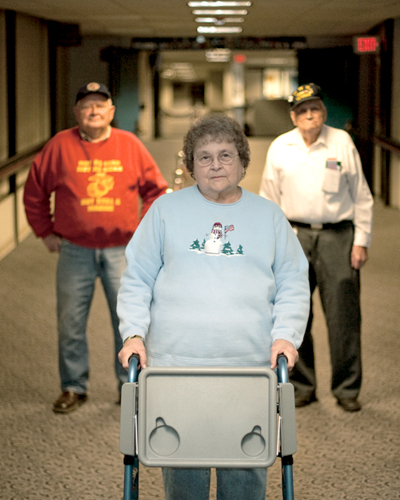|
Reviews of Recent Independent, Foreign, & Documentary Films in Theaters and DVD/Home Video
Edited, Written & Directed by Aron Gaudet Produced by Gita Pullapilly Released by International Film Circuit USA. 84 min. Not Rated The Way We Get By is the Hallmark-card weepie you’d expect it to be, only longer. Even at 84 minutes—relatively short for a feature—it feels twice as long as it should be. Aron Gaudet’s directorial debut centers on the lives of three senior citizens from Bangor, Maine, who spend most of their time at the city’s international airport, which happens to be the first encountered by flights coming into the United States from the east and is often a stopping point for American troops coming home from Iraq. The three protagonists personally greet and shake hands with the troops as they step off their planes. Gaudet attempts to flesh out his documentary by delving into the personal lives of his subjects. Bill Knight, 87, served in World War II and now faces mountains of debt; Jerry Mundy, 74, develops a close relationship with his dog following his son’s untimely death; and Gaudet’s mother, Joan, 75, struggles with loneliness after raising eight children, most of whom have moved away. Gaudet’s aim is to show how troop greeting brings a sense of solace and meaning to their lives. It’s a touching if obviously cloying subject—for a short; but as we’re introduced to all the minutiae of the subjects’ lives, we start to feel like the bored dinner guests who sit impatiently while the host shares a slide show of treasured moments. Most of the airport scenes are filler, repeated instances of troops arriving, being moved by the greeters, calling their loved ones, and crying (in close up, of course…cue music). Gaudet is endlessly fascinated by these people, as we might be, if we knew them personally. As film subjects, however, they are not particularly compelling. Gaudet’s naiveté regarding this point is clear even in the press notes, in which he tells the audience what it should feel and goes so far as to call his own piece “well-crafted,” “polished,” and “unique.” One thing that is fascinating is the subjects’ various political convictions. Knight is disturbingly hawkish, saying that he’d gladly go to Iraq without a second thought, if he could. He also says that you can’t just sit around when you’re under attack; you must protect your country—as if it were the Iraqis who preemptively struck against us. Mundy considers himself an independent and finds fault with America’s involvement in the war. Gaudet’s mother, the most apolitical of the three, simply loathes the idea of young men and women having to die. In the end, The Way We Get
By amounts to a harmless, formulaic, and unchallenging set of
heart-tugging moments. There’s nothing more to the characters other than
their everyday suffering, and no discernible theme other than the worn
one of war being sad and terrible. If you seek a truly brutal and
horrifying illustration of war’s most ugly and dehumanizing consequences
(one astounding in not only its lack of political imperative but its
implicit condemnation of film’s ability to glorify and sentimentalize
wartime violence), see The Hurt Locker. Rich Zwelling
|


